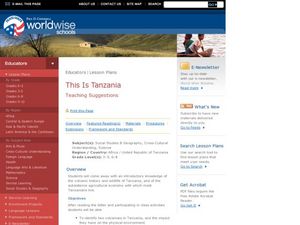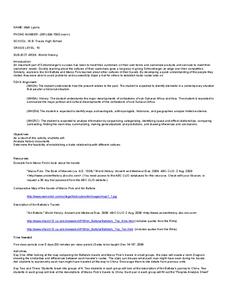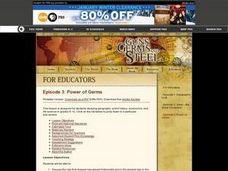Curated OER
The "Science" of Racism
How can we keep racism out of our society? Analyze the factors that lead to racism today and research previous scientific findings that impacted social policy. Your high school high schoolers identify ways to prevent past mistakes from...
Curated OER
European Exploration, Trade and Colonization
Students complete many activities including mapping, reading books, and Internet research to learn about European exploration. In this European lesson plan, students study geographical mapping, trade, and colonization.
Curated OER
Crisis in Sudan: Responding to Medical Emergencies
Students examine the crisis in Sudan. They identify the medical situation in the region and discover how they respond to emergencies. They research diseases that are prevalent in the region as well.
Curated OER
Geographic Luck
Learners examine why some countries are rich while others remain poor. They view a video on the website, Guns, Germs and Steel, analyze primary sources to conduct research about plants and animals, and create a game based on their research.
Curated OER
The Westward Movement
Students study the westward movement through examining stamps. For this westward movement lesson plan, students draw conclusions, determine cause and effect relationships and examine the westward movement of the United States by...
Curated OER
Going...going...gone? Tropical Rainforests-How They Work, What They Do for Us, What's Being Done to Them...
Sixth graders explore the Tropical Rainforest and come to understand what it is and how it affects the ecosystem. In this rainforests lesson, 6th graders write about the Tropical Rainforest, imagine they are in the Tropical Rainforest,...
Curated OER
The Sahara: Home of the Tuareg
Students research and analyze the Tuareg and other groups as well, including their own, and examine the impact culture has on environment.
Curated OER
Traveling the Silk Road: A Multimedia Approach
Students transfer what they have learned about China into an electronic project. In this collaborative project, students take what they have learned from their textbooks and synthesize the information in order to create an electronic...
Curated OER
Gandhi’s 12 Vows: Training Warriors of Non-violence
Learners examine Gandhi’s ‘Walk n Talk’ strategy. In this lesson on civil disobedience, students evaluate Gandhi’s non-violent method of satyagraha as an effective mode of revolution.
Curated OER
China - the Geography of European Imperialism - Spheres of Influence in China
Ninth graders create a map of China. They identify the various spheres of influence carved out by the Imperialist powers of Europe as well as locating geographical features of china and major cities. They explain the global impact of...
Curated OER
Writing a Historical Poem
Students work together to research a historical event. They create their own poems based on their research. They share their poems with the class and discuss the historical event further.
Curated OER
The Peanut Wizard
Students read and discuss information regarding George Washington Carver and how the peanut became cultivated in the southern colonies of the United States. In this George Washington Carver lesson plan, students develop vocabulary that...
Curated OER
Using Effective, Evocative Writing as a Model
Students study an author's style to strengthen their own writing. They read an author's account of the resiliency of the Malian people and about their culture. They examine her focus on Malian women.
Curated OER
This Is Tanzania
Young scholars explore Tanzania. In this geography skills activity, students read This is Tanzania by Richard Lupinsky, Jr. and discuss the impact that volcanoes have had on the nation. Young scholars analyze the imagery in Lupinsky's...
Advocates for Human Rights
Who are Immigrants?
What do Jerry Yang, Patrick Ewing, John Muir, Charlize Theron, Peter Jennings, and Saint Frances X Cabrini all have in common? They are all immigrants to the United States. Famous and not-so-famous immigrants are the focus of a resource...
Curated OER
Light the Torch: The First Modern Olympic Games
Explore many aspects of the first modern Olympic Games in your classroom.
Global Oneness Project
Reclaiming Rivers
Robert Hass's article "Rivers and Stories" underscores the importance of rivers in the development of civilization and the importance of reclaiming supposedly dead rivers and implementing policies that protect river health. Groups...
John F. Kennedy Presidential Library & Museum
Military Advisers in Vietnam: 1963
How did the beginning of the Vietnam War factor into the Cold War with the Soviet Union? As part of a study of American involvement in Vietnam, class members read a letter address to President Kennedy and his response in which...
Curated OER
Medieval Travelers
Tenth graders explore the impact of trade on culture. In this trade lesson plan, 10th graders compare the travels of Marco Polo and Ibn Battuta. Students research the explorers and create materials for a gallery walk that feature the...
Curated OER
This Land is Your Land
Young scholars consider the concept of borders and their development by looking at maps and documents. They create a presentation highlighting a current border dispute and propose solutions.
Curated OER
Views of the American West: True or False?
High schoolers explain that a landscape painting may or may not accurately represent a specific place. They identify techniques that create the illusion of three-dimensional space on a flat surface.
Curated OER
Power of Germs
Learners view the film, Guns, Germs, and Warfare. They create projects based on the impact of germs on the development of societies and countries.
Curated OER
Teaching With the Power of Objects
Students define value of an object. In this value lesson plan, students identify reasons for collecting objects, compile a personal inventory of items they find valuable, and then define why those items are valuable to them. In step two...
Curated OER
Playing Historical Detective: Great Grandmother's Dress and Other Clues to the Life and Times of Annie Steel
Students draw conclusions about an mystery person based on documents and artifacts provided. In this drawing conclusions activity, students become detectives by reading and analyzing evidence provided. This activity includes...























